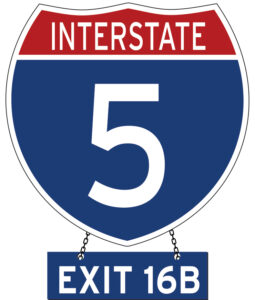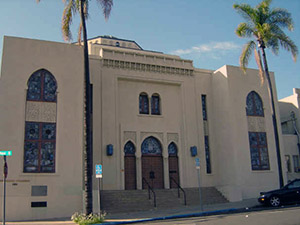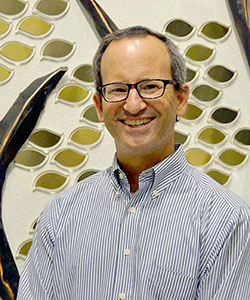Chapter 25, Exit 16B (6th Avenue): Ohr Shalom Synagogue

 From offramp, turn right onto 6th Avenue at Laurel take a left, Ohr Shalom Synagogue is 2512 Third Avenue, at the northwest corner of 3rd and Laurel.
From offramp, turn right onto 6th Avenue at Laurel take a left, Ohr Shalom Synagogue is 2512 Third Avenue, at the northwest corner of 3rd and Laurel.
Built in 1926, the synagogue building at 3rd and Laurel was the long-time home of the Reform congregation, Beth Israel, until that congregation, having outgrown the facility, moved to a campus just east of La Jolla. Preservationists were successful in preventing any part of the sanctuary building and social hall from being replaced by a real estate development. Thereafter, the historic building was occupied by a Conservative congregation and renamed as Ohr Shalom Synagogue.

Serving as spiritual leader there since 2003, Rabbi Scott Meltzer and his wife Jennifer gave considerable thought to what kind of gifts for bar mitzvah boys and bat mitzvah girls might be both appropriate and inspirational. At first, the rabbi presented tzedakah boxes to the b’nai mitzvah in the hope that they would fill them up with dollars to be contributed to worthy causes. Now, the religious school donates the tzedakah boxes.
Some students follow through, but for others the tzedakah boxes become soon-to-be-forgotten souvenirs of the ceremony in which they led their congregation in prayer and became, from the standpoint of Jewish ritual observance, fully functioning adults.
The rabbi was inspired in 2013 when he read a book by Bob Harris titled The International Bank of Bob: Connecting Our Worlds, One Kiva Loan at a Time. “Kiva” is a Swahili word meaning “unity” The Kiva organization promotes world unity by arranging micro-loans to enable people all over the world to start up a business and to improve lives in their communities.

Beginning in 2014, Rabbi and Mrs. Meltzer invested $100 per month in the Kiva organization until they had built up a credit of approximately $8,000. They pored over lists of worthy borrowers, who were vetted by Kiva’s microloan partners throughout the world. The Meltzers then decided to which borrowers they wished to make interest-free repayable loans.
“At this point, I think we have made 1,000 loans,” all of which were repaid and then recycled, Rabbi Meltzer commented during an interview in November 2021. “There were times that we did it with our children” – who at the time of the interview were Shayna, 19; Nadiv, 17; Matail, 15; and Yael, 13. As they grew up, they had a range of interests including supporting sustainable agriculture and education.
When contributing in his own name, the rabbi made micro-loans to “women borrowers only – my own little piece for supporting the important work of women. I think as a general rule they get the short end of the stick in most places, and I like to think that the ‘International Bank of Scott’ affirmed all principles of affirmative action, including to women. It is true in the United States and I’m sure it is also true in Africa and Asia that women have a harder time qualifying for funding. The relationship between quality of life in countries and the ability of women to be financially independent correlate very highly across the 195 countries there are in the world.”
I first learned of the kiva program when my wife Nancy and I attended the bat mitzvah of Sarah Golembesky on October 16, 2021. After she gave a speech about how the Torah portion Lech Lecha connects the Jewish people to the Land of Israel, the rabbi conferred upon her congratulations and some gifts. In one envelope was a certificate, which he had printed out from his Kiva account, for $30 which Sarah could utilize to help underwrite any of the many projects around the world for which borrowers needed funding.
Trying to explain to me by telephone a week later how this process unfolds, Rabbi Meltzer kindly sent to me a similar $30 Kiva credit so that I could loan it somewhere within Kiva’s worldwide network. I chose to designate it as a loan for an Israeli woman named Munya, who had been vetted by Kiva’s field partner, Koret Israel Economic Development Funds (KIEDF).
According to Kiva’s website, “KIEDF targets some of the most marginalized groups in Israel with microfinance services, specifically working with Bedouins, Haredi women, and Israeli-Ethiopians.”
“By supporting this loan,” the Kiva website stated, “you are supporting a borrower who otherwise would have very limited access to financial services.”
Munya’s hope was to raise $6,250 to purchase materials for facial treatments, appliances, and an air conditioner for her home business. She “provides medical cosmetic treatments, beauty treatments and sells creams and lotions. She is a trained cosmetologist with extensive coursework. She worked in the field before opening her own salon.”
Raising $6,250 will require 250 contributions of $25 each, which will be collected by Kiva and
sent through KIEDF to Munya. A similar process can help borrowers in a total of 80 countries. Eventually, Munya will pay the $6,250 back, and $25 will be recredited to my new Kiva account, which I will then be able to loan to someone else.
If someone receives certificates like Sarah and I did from Rabbi Meltzer, but fails to designate a loan recipient, then after a certain time frame, the money will be absorbed into Kiva’s general fund for loans the non-profit organization considers appropriate.
When I interviewed Rabbi Meltzer, he had approximately $6,000 in working loans and a reserve of another $2,000. Sometimes, he said, he will make larger loans, perhaps in denominations of $100 or more, to various recipients so that his capital will be put to use.
The reason he likes giving Kiva certificates to bar and bat mitzvah students is because it presents the possibility of “instilling within the students a real-life time commitment to tzedakah,” a Hebrew word meaning both “charity” and “justice.”
Rabbi Meltzer commented, “I think that happy moments (like a bar/bat mitzvah celebration) are good times to think about how we take care of others.”
It’s an enjoyable way to practice social responsibility, he added. “Kiva has a 98 percent loan repayment rate,” so in recycling the same dollars, “it feels like Monopoly money that just keeps doing good.”
*
Next Sunday, June 26, 2022: Exit 17A (Hawthorn Street): County Administration Building
This story is copyrighted (c) 2022 by Donald H. Harrison, editor emeritus of San Diego Jewish World. It is an updated serialization of his book Schlepping and Schmoozing Along Interstate 5, Volume 1, available on Amazon. Harrison may be contacted via donald.harrison@sdjewishworld.com